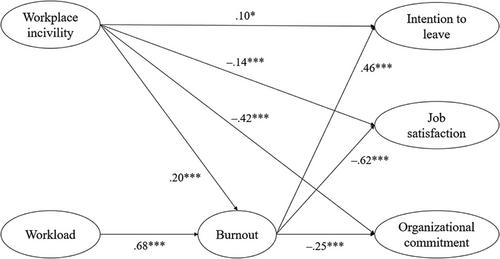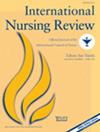Effects of workplace incivility and workload on nurses’ work attitude: The mediating effect of burnout
Abstract
Aim
The study's aim was to examine how workplace incivility and workload influence nurses' work attitudes (turnover intention, job satisfaction, and organizational commitment) using the stress–strain–outcome framework.
Background
There is a lack of comprehensive research on the combined effects of workplace incivility and workload on nurses' work attitudes.
Introduction
Two workplace stressors, incivility and workload, were hypothesized to lead to burnout, which in turn influences nurses’ work attitudes.
Methods
A cross-sectional, descriptive correlational study was conducted. Survey data were collected from 1,255 direct care nurses with a minimum of 6 months’ nursing experiences in 34 general hospitals across Korea. Structural equation modeling was used to test the hypothesized model. This study is reported using the STROBE checklist.
Results
As hypothesized, both workplace incivility and workload increased burnout. Heightened burnout correlated with increased turnover intention, lowered job satisfaction, and reduced organizational commitment. While workplace incivility impacted these outcomes both directly and indirectly via its effect on burnout, workload influenced the outcomes solely through burnout.
Conclusion
The study's findings are based on one, nonrandomized sample of nurses working at South Korean hospitals. Despite such study limitations, the study findings support the adverse impact of two workplace stressors on burnout and nurses’ work attitudes.
Implications for nursing
Evidence-informed interventions for both workplace stressors include training programs, clear policy guidelines, open communication channels, and supportive work environments.
Implications for nursing and health policy
Zero tolerance and equity, diversity and inclusivity policies to promote workplace civility must be enforced. Workload needs to be patient-centered, ensuring a “fit” between patient needs and nurse staffing.


 求助内容:
求助内容: 应助结果提醒方式:
应助结果提醒方式:


